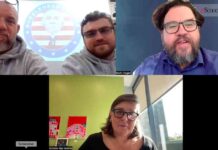In a small building just outside Indianola, Mississippi, a 14-year-old named Tamorris Carter shared his experiences at the Sunflower County Freedom Project. This program offers educational opportunities to students, known as “Freedom Fellows,” ranging from third to 12th grade. The curriculum includes subjects like Black and Indigenous history, math, reading, and public speaking, along with college preparation.
The majority of Freedom Fellows at the Sunflower County location come from Indianola, a town where 84% of the population is Black and nearly a third live in poverty. The town is surrounded by cotton fields and is close to the Mississippi State Penitentiary. Despite the challenges faced by the community, the Freedom Project Network aims to empower students to make positive changes within their communities.
LaToysha Brown, the executive director of the organization, emphasizes that the goal is not just to send kids to college but to equip them with the tools to create meaningful change. The program takes inspiration from the Student Nonviolent Coordinating Committee’s Freedom Schools of 1964, which aimed to provide Black students with an empowering education to advocate for racial justice.
For Tamorris, joining the Freedom Project was eye-opening. He learned about the history of segregation in Indianola and the impact it had on his education. Through the program’s “liberatory pedagogy,” he gained a deeper understanding of systemic issues like racial capitalism and social dominance orientation.
The Freedom Project encourages students like Tamorris to share their knowledge and experiences with their communities. Through presentations and projects, students learn to analyze society and take action to create positive change. By empowering students with a comprehensive education that goes beyond traditional textbooks, the Freedom Project aims to build a generation of leaders who can address pressing issues in their communities.
The work of organizations like the Freedom Project Network is crucial in providing students from underserved communities with the tools they need to succeed and make a difference. By filling in the gaps left by traditional education systems, programs like these empower students to challenge injustice, advocate for change, and create a better future for themselves and their communities.
Education is not just about acquiring knowledge; it’s also about understanding the world around us and using that knowledge to effect positive change. The Freedom Project Network exemplifies this philosophy by equipping students with the skills and confidence to be leaders in their communities and beyond. Through programs like these, we can nurture the next generation of changemakers who will work towards a more just and equitable society.


